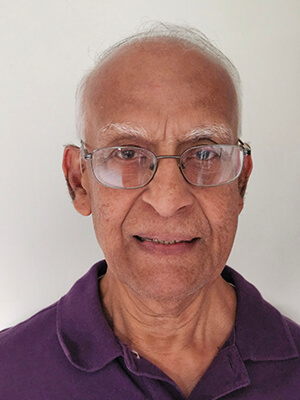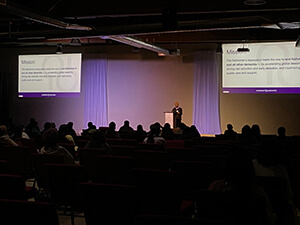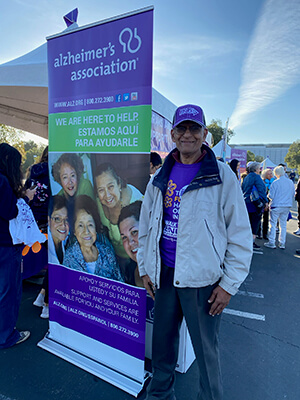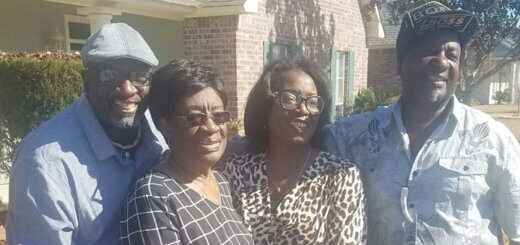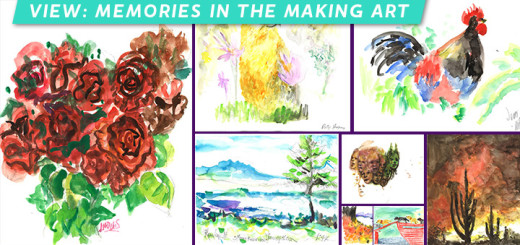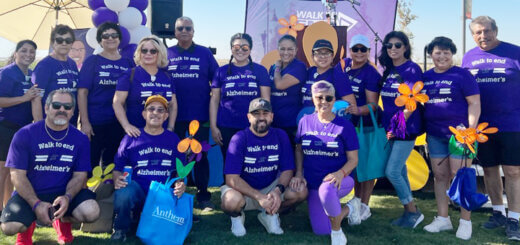South Asian volunteer combats stigma by helping to educate his community
By Anjali Sadarangani
When Partha Parthasarathy lost his mother to Alzheimer’s in 2014, he began volunteering with the Alzheimer’s Association®. Partha has used his skills to volunteer in different capacities at the Association including education, support, and advocacy. Now, Partha works as a support group facilitator, and focuses on addressing the stigma in the South Asian community around dementia.
His mother’s undiagnosed Alzheimer’s
Partha remembers his mother as an active, social and happy person. For about five years, Partha’s mother received medical care in India without knowing she had Alzheimer’s. Supported by his siblings, Partha’s mother was cared for during her disease progression.
All of his siblings noticed how their mother was having issues with her memory. “She kept asking the same questions over and over again and experiencing short and long-term memory lapses,” said Partha. “Eventually, after she lost mobility and developed behavior issues,, she was placed in a care [setting].”
While Partha’s mother was never formally diagnosed, Partha now understands that these symptoms were the early signs of dementia.
The warning signs
As previously mentioned, Partha’s mother showed one of the hallmark symptoms of Alzheimer’s and other dementias – extensive memory loss. Sometimes forgetting names or appointments but remembering them later can happen as a person ages. However, forgetting recently learned information, important dates or events, or asking the same questions over and over, is a sign of dementia.
Another sign Partha’s mother displayed was losing track of dates, seasons and the passage of time. People who have dementia may have trouble understanding something if it is not happening immediately. Sometimes they may forget where they are or how they got there.
Becoming a volunteer
After losing his mother in 2014 and then retiring from his work as an engineer, Partha knew he wanted to help find a cure. “I was looking for something to do,” said Partha “[I wanted] to do something related to finding the treatment and cure for this disease. I called the Alzheimer’s Association and they said, ‘Sure.’ I’ve been [volunteering] since that time.”
First, Partha started volunteering as a Community Educator. Community Educators are individuals trained to deliver presentations on topics relating to dementia. During this time, Partha worked at senior centers and health fairs on behalf of the Association.
Partha also volunteered for the Alzheimer’s Association Walk to End Alzheimer’s® event in the East Bay. Walk to End Alzheimer’s is an inspiring event that fundraises for Alzheimer’s research, care and support.
Initially, Partha was a member of the Walk Committee. Members of the Committee play a key role in the success of each event, from getting local companies involved to helping participants engage with the Association’s mission to planning the event experience. Currently, Partha helps out on the day of the event.
Another way Partha volunteered with the Association was as a Support Group Facilitator. Facilitators are volunteers that lead group discussions for caregivers whose loved ones are affected by Alzheimer’s. These groups create a safe environment for individuals to cope with this disease. Partha served as a facilitator in Livermore for three years, but transitioned to a support group in Martinez, where he continues to spend his free time.
Finding a community
To Partha, volunteering as a facilitator has allowed him to find a sense of community within the Association. He enjoys forming connections with other individuals and helping them realize that they are not alone when facing this disease. Unlike his other roles within the Association, Partha enjoys how this role allows him to work directly with caregivers.
“During the support group, I deal with caregivers who are caring for loved ones,” said Partha. “I get to talk to people one-on-one. My role is to facilitate a discussion and give guidance when people need information”.
To caregivers, Partha advises them to take advantage of many of the free resources available such as:
- The Alzheimer’s Association 24/7 Helpline (800.272.3900)
- Support Groups both online and in-person
- Education programs
- Website at alz.org
- Online community
Disease stigma
Looking back, Partha credits his lack of understanding regarding his mother’s condition to some of the stigma that Alzheimer’s faces in South Asian communities. He attributes some of this stigma to the confusion and often interchangeability that dementia and mental health issues undergo. Partha’s not alone in this sentiment, as it is estimated by the Alzheimer’s Association 2024 Alzheimer’s Disease Facts and Figures report that about 25% of Asian Americans lack family support in dealing with Alzheimer’s.
To help deal with this, Partha joined the South Asian Advisory Council, whose main job is to bring awareness about Alzheimer’s to these particular communities. This committee has Zoom meetings and in-person events that Partha attends. Partha hopes in spreading information about dementia and Alzheimer’s, they will be viewed with the same level of compassion and recognition as diseases such as cancer.
Hope and moving forward
Partha finds his time and current work at the Alzheimer’s Association rewarding, and hopes that others feel encouraged to become volunteers for the Association. From both his personal and volunteer experiences, he recognizes that research advancements still need to be done and that this disease not only affects millions of individuals, but also places stress on caregivers. He especially encourages youth to join advocacy initiatives. He believes that these efforts will keep the conversation around Alzheimer’s relevant both within his community and to larger audiences.
Partha remains a dedicated volunteer to the Association who believes that “helping caregivers is the biggest issue for him at present. As far as finding a cure and treatment “there is a lot to be done.”
For more information on how to become a volunteer for the Alzheimer’s Association visit alz.org/norcal/volunteer.
For more information on Asian American resources visit alz.org/asianamerican.





